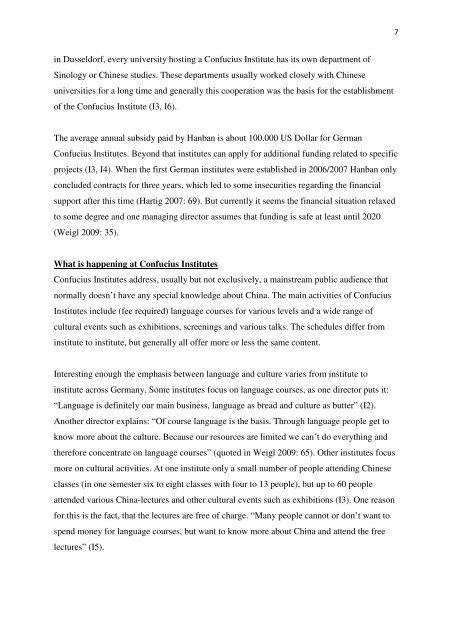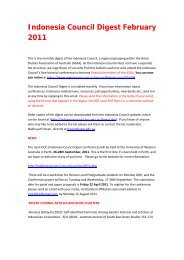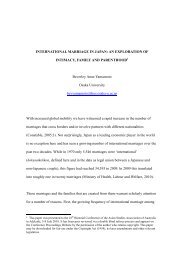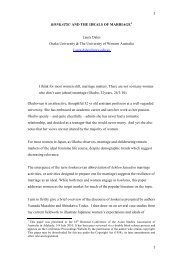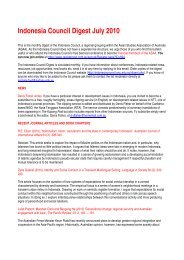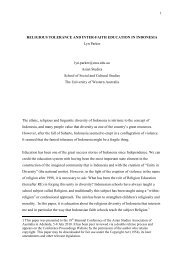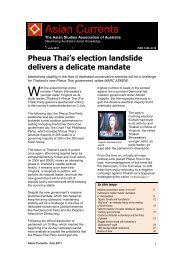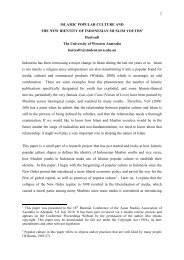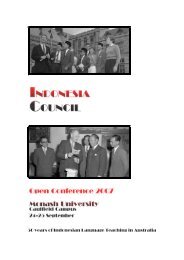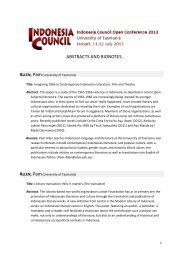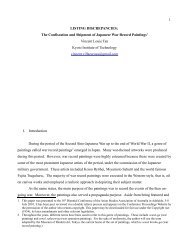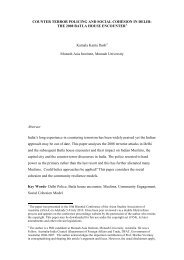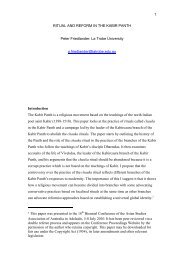CONFUSION ABOUT CONFUCIUS INSTITUTES Soft Power Push or ...
CONFUSION ABOUT CONFUCIUS INSTITUTES Soft Power Push or ...
CONFUSION ABOUT CONFUCIUS INSTITUTES Soft Power Push or ...
You also want an ePaper? Increase the reach of your titles
YUMPU automatically turns print PDFs into web optimized ePapers that Google loves.
in Dusseld<strong>or</strong>f, every university hosting a Confucius Institute has its own department of<br />
Sinology <strong>or</strong> Chinese studies. These departments usually w<strong>or</strong>ked closely with Chinese<br />
universities f<strong>or</strong> a long time and generally this cooperation was the basis f<strong>or</strong> the establishment<br />
of the Confucius Institute (I3, I6).<br />
The average annual subsidy paid by Hanban is about 100.000 US Dollar f<strong>or</strong> German<br />
Confucius Institutes. Beyond that institutes can apply f<strong>or</strong> additional funding related to specific<br />
projects (I3, I4). When the first German institutes were established in 2006/2007 Hanban only<br />
concluded contracts f<strong>or</strong> three years, which led to some insecurities regarding the financial<br />
supp<strong>or</strong>t after this time (Hartig 2007: 69). But currently it seems the financial situation relaxed<br />
to some degree and one managing direct<strong>or</strong> assumes that funding is safe at least until 2020<br />
(Weigl 2009: 35).<br />
What is happening at Confucius Institutes<br />
Confucius Institutes address, usually but not exclusively, a mainstream public audience that<br />
n<strong>or</strong>mally doesn’t have any special knowledge about China. The main activities of Confucius<br />
Institutes include (fee required) language courses f<strong>or</strong> various levels and a wide range of<br />
cultural events such as exhibitions, screenings and various talks. The schedules differ from<br />
institute to institute, but generally all offer m<strong>or</strong>e <strong>or</strong> less the same content.<br />
Interesting enough the emphasis between language and culture varies from institute to<br />
institute across Germany. Some institutes focus on language courses, as one direct<strong>or</strong> puts it:<br />
“Language is definitely our main business, language as bread and culture as butter” (I2).<br />
Another direct<strong>or</strong> explains: “Of course language is the basis. Through language people get to<br />
know m<strong>or</strong>e about the culture. Because our resources are limited we can’t do everything and<br />
theref<strong>or</strong>e concentrate on language courses” (quoted in Weigl 2009: 65). Other institutes focus<br />
m<strong>or</strong>e on cultural activities. At one institute only a small number of people attending Chinese<br />
classes (in one semester six to eight classes with four to 13 people), but up to 60 people<br />
attended various China-lectures and other cultural events such as exhibitions (I3). One reason<br />
f<strong>or</strong> this is the fact, that the lectures are free of charge. “Many people cannot <strong>or</strong> don’t want to<br />
spend money f<strong>or</strong> language courses, but want to know m<strong>or</strong>e about China and attend the free<br />
lectures” (I5).<br />
7


